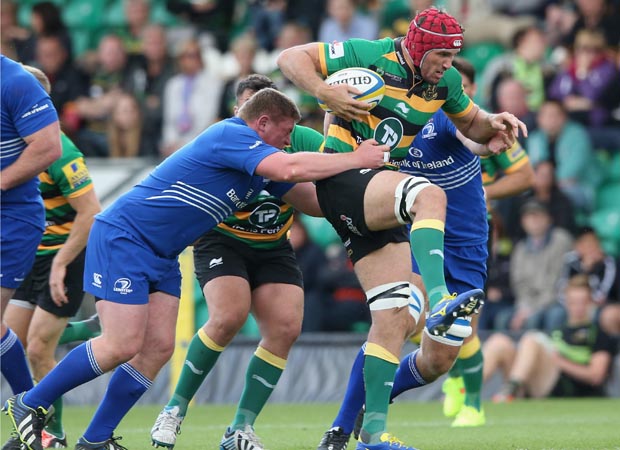 The Autumn Internationals may be up and running but for the clubs its business as usual with the LV cup holding the fort. While the LV may not be the most glamorous of competitions taking place as it does when most of the big names are away on international duty, it gives a chance to all the hopeful stars of the future who are usually condemned to a life on the bench.
The Autumn Internationals may be up and running but for the clubs its business as usual with the LV cup holding the fort. While the LV may not be the most glamorous of competitions taking place as it does when most of the big names are away on international duty, it gives a chance to all the hopeful stars of the future who are usually condemned to a life on the bench.
As well as showcasing potential new talent, the LV provides the journeymen of the game with match day income, rather than just the retainer fees they would receive if the clubs were to shutdown during the internationals. It also helps to create a problem for the new RPA chairman Christian Day.
As reported in last week's Rugby Paper, Christian Day has warned of possible player strikes if player welfare is not taken seriously by the PRL and RFU and has called for mandatory summer rest periods, better insurance and fewer games.
Laudable aims and a great sound bite, particularly when he couples it with the line, ‘After all we're the ones earning their money'. True, but unfortunately nowhere near enough money to actually pay for the game as it is, let alone with the ‘improvements in player welfare' included.
The comparison made with American sport where player power has forced a number of changes (usually based around increased salary payments) doesn't hold water, because the sports that he is comparing are like chalk and cheese when it comes to finance.
American sports like NFL are multi billion dollar franchises with virtually no competition in the USA from global sports like soccer or rugby which are largely played there at amateur or semi professional level.
Although many Americans will play American Football at college there are no amateur leagues for the sport and no structure to support a meaningful community game, so only a chosen few will carry on playing the game once they leave college.
Add to that the small point that there are more than 317 million people in the USA and NFL is a majority sport at school age, while we have just over 64 million and rugby is a minor sport.
The NFL is the richest professional sport in the world earning around $6billion. Compare that to the Premiership, which runs at a loss, and the RFU, the richest Union in the world which makes only tens of millions of pounds not hundreds and must provide for the whole game.
The cost of implementing longer summer rest periods and better insurance would effectively bankrupt most clubs and would have little or no impact on player welfare.
As Day stated, the maximum number of games a player plays is 32 at one game a week – simple maths tells you that leaves a 20 week break from competitive rugby for the majority of professional players.
Although much of the 20 weeks would be taken up with preparation training for the next season, there is still a mandatory break of eight weeks even for those players who take part in international tours.
His statement that over the last four years there have been more enforced retirements than ever before may be true, but a number of those who have retired could have played on but would have had to do so without insurance cover for any recurrence of a chronic injury, making retirement a financial choice not a physical one.
The problem for Christian Day is, player welfare is more a matter for coaches and players than the PRL or RFU.
The game of rugby can be played in many different ways including a very physical battering of the opposition with a bigger more powerful group of players, or attempting to skillfully out-flank the opposition by continually moving the ball and restricting the physical contact. The current vogue for bigger and stronger players is coach lead, as each attempt to batter the opposition into submission and run through players, not around them.
This style of game is the complete antipathy of player welfare and yet it is the favoured method chosen by a majority of our professional coaches and the style of game we see played out each week in the Premiership.
The simple explanation is that it is far easier to coach a physical game than a skill game and you don't need special players, just big ones.
The more complicated answer is that it is a long season and in a league with promotion and relegation the physical game is a low risk option. It is far harder to find players capable of playing the skill game and yet, as New Zealand have shown over the years, it is possible.
One of the interesting facts about the All Blacks is that with some notable exceptions they are usually smaller than other international sides and rely much more on a skill game, moving the ball and avoiding players rather than trying to break tackles. Unless more coaches are prepared to try that approach, player welfare will not improve and players will continue to be injured.
I also disagree with him on why players carry on playing when injured, it is not as he suggests, showing how tough they are, it is fear. The LV showed last week that there are plenty of young talented players waiting for their chance and injury gives them that chance.
If, as a senior player on an expensive contract you suffer too many injuries and are unavailable for selection and a younger player comes in and does well, you may not have your contract renewed.
There are very few Jonny Wilkinson's and, as Geoff Cooke said, “Finding an indispensable man is like putting your hand in a bucket of water, grabbing what you can, pulling your hand out and seeing the hole that's left.”



























